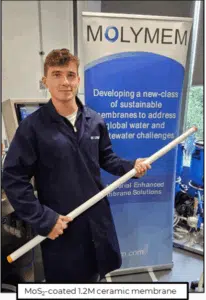Molymem Ltd is proud to announce its participation as a key partner in GENESIS, a transformative €55 million European project aiming to significantly reduce the environmental footprint of semiconductor manufacturing. Funded under the Horizon Europe programme and coordinated by CEA-Leti, the GENESIS project brings together 58 leading partners including SMEs, research and technology organisations (RTOs), and major semiconductor industry players from across Europe.
Semiconductors are the foundational components of modern electronics – from smartphones to data centres – yet their production involves complex processes that generate a substantial environmental impact. GENESIS has been launched to directly tackle these challenges by redesigning the sector’s materials, processes, and supply chains.
Over the next 36 months, the project will pursue a number of ambitious goals, including developing an integrated strategy to reduce emissions, pollution, and reliance on critical substances, including per- and polyfluoroalkyl substances (PFAS), and deploying real-time sensing and monitoring tools for improved environmental control. PFAS are a class of synthetic chemicals widely used in semiconductor manufacturing for their thermal stability and chemical resistance. However, PFAS are persistent in the environment and linked to adverse human and ecological health effects. Their presence in wastewater poses a significant challenge due to their resistance to conventional treatment methods, prompting urgent regulatory and technological responses across the EU and beyond.
Molymem’s Role:
Within the GENESIS consortium, Molymem will leverage its proprietary MoS₂-coated ceramic nanofiltration membranes to tackle PFAS contamination in challenging semiconductor wastewater streams. Molymem’s role is to:
- Remove and concentrate PFAS from multiple semiconductor process effluents.
- Demonstrate advanced treatment-train solutions that are cost-effective and operationally efficient (low OPEX).
- Contribute to the development of sustainable wastewater management approaches in the semiconductor sector.
“We’re delighted to be part of such a bold and ambitious initiative,” said Dr. Paul Wiper, CTO and Business Development Manager at Molymem. “The GENESIS project gives us a platform to scale the impact of our advanced nanofiltration technology, address PFAS pollution in a critical industry, and collaborate with Europe’s leading innovators on the green transition.”
Project Coordination and Funding:
GENESIS is coordinated by CEA-Leti, a world-renowned French research institute in microelectronics and nanotechnology. The project is co-funded by the European Union under Horizon Europe, the Chips Joint Undertaking (Chips JU), SERI (Switzerland), and Innovate UK, along with contributions from national agencies across Europe.
The GENESIS consortium includes a diverse group of stakeholders – ensuring that breakthroughs in research are effectively translated into real-world solutions across the full value chain of semiconductor manufacturing.
About Molymem:
Molymem is a UK-based advanced materials and membrane technology company focused on solving complex water treatment challenges. Originating from research at The University of Manchester, Molymem’s patented nanofiltration membranes combine ceramic robustness with the unique surface properties of two-dimensional materials. The result is a powerful platform for selectively removing contaminants – including PFAS – from even the most difficult industrial effluents.
For media inquiries:
Dr Donnchadh Barry
Technical Manager
Molymem Ltd
Email: donnchadh@molymem.com




